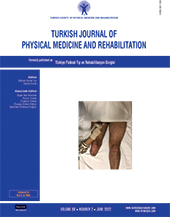The reliability and validity of the Turkish version of the brief pain inventory-short form in patients with cancer pain
2 Department of Physical Medicine and Rehabilitation, Sancaktepe Şehit Prof. Dr. Ilhan Varank Training and Research Hospital, Istanbul, Türkiye
3 Department of Physical Medicine and Rehabilitation, Maltepe University Medical Faculty Hospital, Istanbul, Türkiye
4 Pain Medicine Clinic, University of Health Sciences, Dr. Abdurrahman Yurtaslan Ankara Oncology Training and Research Hospital, Ankara, Türkiye
5 Department of Physical Medicine and Rehabilitation, Pain Medicine Clinic, Marmara University School of Medicine, Istanbul, Türkiye DOI : 10.5606/tftrd.2022.6634 Objectives: The aim of this study was to evaluate the reliability and validity of the Turkish version of the Brief Pain Inventory (BPI-TR) in patients with cancer pain.
Patients and methods: The study included 130 patients (70 females, 60 males; mean age: 56.1±13.3 years; range, 18 to 87 years) diagnosed with any type and stage of cancer between April 2017 and March 2018. Brief Pain Inventory, Pain Disability Index, EORTC QLQ C30 and Pain Management Index were used to collect data. The reliability of the scale was tested with `internal consistency` and its validity with `construct validity`. Cronbach`s alpha values of >0.70 were accepted as the threshold for internal consistency. Construct validity was tested in the context of structural validity with factor analysis and also tested in terms of convergent construct validity by investigating its correlation with the Pain Disability Index (PDI) and the European Organization for Research and Treatment of Cancer Quality of Life Questionnaire Core 30 (EORTC QLQ-C30).
Results: The internal consistency of pain severity and pain-related interference was found as 0.91 and 0.95, respectively. The alpha coefficient was found to be between 0.795 and 0.873 for the pain severity index and between 0.729 and 0.861 for the pain-related interference index. There was a clear link between the BPI-TR pain severity index and the ninth question in the EORTC QLQ-C30 (rho=0.66, p<0.05). The association between the BPI-TR interference index and the 19th question in the EORTC QLQ-C30 was also strong (rho=0.77, p<0.05). The correlation between the BPI-TR interference index and the PDI was found to be moderate (rho=0.50, p<0.05).
Conclusion: The BPI-TR was found to be a reliable and legitimate tool to evaluate cancer pain in the Turkish population.
Keywords : Cancer pain, disability evaluation, pain management, pain measurement
















